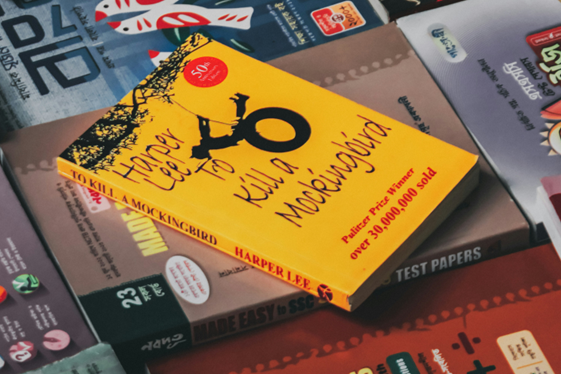
Books for law students are not just about the laws and cases - there are also books that can inspire students to become the best lawyers. Find out what they are in this article

Updated 27 June 2024
Books are the best friends of law students, and even lawyers themselves. From answering questions on whether to study law to guiding students during their law school life, there’s always a book to meet every need.
Books for law students are a guide in every stage of their legal career. But what are these books that are essential to survive law school?
In this article, we’ll go through all sorts of books for law students. We’ll go through titles that are considered required reading for any law student. We’ve also listed a few that aim to provide some inspiration and guidance throughout the journey.
Students who are about to enter law school will have hundreds of questions. This may be about how they should decide whether to study law or not, and then choosing the best law school for them. To help aspiring lawyers with their questions, there are books that students can read before deciding on which law school to apply to.
In today’s technological world, most people will naturally start with a Google search for “law school,” “first year of law school,” “getting into law school,” or its variations. Online searches might quickly lead to popular web sites of:
However, web searches may not be effective all the time. Steven Bodi, a graduate of the Queen’s University Faculty of Law, said that as students search for pre-law school materials, “some might neglect the age-old building of public access.” He refers to libraries and books for law students as still some of the best sources to help future law students. “Books may be a non-traditional — yet paradoxically traditional — way of obtaining information.”
“The internet is, of course, not the only source of information. Some will turn to a family friend who is a lawyer, others may have friends or family currently in law school or who went through the experience,” Bodi said. While it’s unlikely to walk into a law firm and get a minute with a lawyer or to show up to the chambers of a judge at a local courthouse, there are other sources that students can rely on.
Bodi suggested two books which he came across after being admitted to law school:
“While it is entirely naïve to think law school will be a walk in the park, after having read these books, I feel more prepared and assured that I’m not alone in this journey I’m about to begin,” Bodi said.
Aside from these suggested books, here’s a podcast on one of the books about mental health in the legal profession in Canada:
For other podcasts on the Canadian legal profession, check our CL Talks page. It features interviews with lawyers, judges, and legal professionals.
Written from a Canadian perspective, The Law School Book: Succeeding at Law School is a good read for those who are thinking about studying law. “With chapters like: 'So, You Want to Go to Law School? The Inside Story' and 'Get a Real Life: Living Through Law School,' a major part of the book is dedicated to helping readers create realistic expectations about their educational experience,” said Bodi.
In the first chapter, the authors begin by exploding the myths. “I was thrilled to see a professor deconstructing myths such as 'a law degree is a meal ticket for life' and 'law school is all theory and no practice.' In fact, the authors inform the reader that the chapter '. . . offers a glimpse at law school — its structure, courses, and mind-set,'” said Bodi.
Even if students think that they know everything there is to know about law school, the book offers more. The other chapters of the book address different elements that every student will encounter, such as:
“I’m confident that every reader who picks up the book will find an answer to a burning question. I sure did,” he said.
The second book provides insight through a different lens: the students themselves. Originally published in 2000, the latest edition of Law School Confidential: A Complete Guide to the Law School Experience: By Students, for Students was published in 2015.
Bodi said that while Hutchinson’s book gives the reader a glimpse of law school, the [book by Miller] walks students through the experience year by year, step by step. Miller begins by challenging the reader with “A Realistic Evaluation of Your Fitness for Law School” and proceeds all the way through to “The Final Hurdle — Strategies for the Bar Examination.”
In this book, Miller describes the journey through law school: “Law school is a hard-edged training ground, meant to take the world view of each law student and shake this world view to its foundation.” As Bodi thought that this may sound frightening, “many will likely embrace the challenge.” By travelling across the US and consulting with professors, graduates, and partners of Manhattan firms, Miller collects an abundance of information every reader can benefit from.
Aside from Miller’s classic book, there are also other books that aspiring law students can read to have an idea of what law school — or one's legal career — may look like. Here are some of them:
A classic novel on the practice of an ideal lawyer, set in the context of racism and social inequalities in the USA in the 1930s. It talks about a complex justice system (which still applies today) and the dilemmas that lawyers might face in their practice.
Its protagonist, Atticus Finch, is considered one of the best fictional lawyers of all time.

Another Kafka novel which was not completed, it’s still one of the most admired books by many in the legal profession, students and lawyers alike. This fictional book deals with Kafka’s view of law and justice, and a story of how these ideals may not be reflected in the real world.
To get a glimpse and understand the demands of law schools to students, Osborn’s book is one of the classics for aspiring lawyers. Whether true or not to the experience of modern law students, The Paper Chase has inspired many lawyers. This book was also adapted into a movie and a TV series, for those who are interested in “reading” it through other mediums.
Aside from being a sneak peek at their future job, these books also aim to inspire students by displaying a brand of lawyers who embody the true purpose of lawyering. While this purpose may differ for everyone, it will always go back to upholding justice and becoming beacons of hope for those in need.
After taking the leap of faith and hurdling the law school admissions, students would now have to purchase the essential books to help them through their law studies. As a 1L student, it’s important to get the necessary books since 1L subjects are about the basics and the foundational courses.
To get the best list of what books to buy, incoming 1L students would have to refer to the following:
It wouldn’t hurt to ask for suggestions from previous students, and the professors themselves, for other materials. If your budget is tight, or if resources aren’t available, you may want to focus on the required materials.
There are two types of law school books that may be required by a professor:
Just Published: Annotated Ontario Securities Legislation, 60th Edition, 2024 (2 Volumes)- https://t.co/ptzVzCmaf3
— LexisNexis Canada Inc. (@LexisNexisCan) May 30, 2024
This book provides essential information for practitioners dealing with securities laws in Ontario including full text of the Ontario Securities Act.@McCarthy_ca pic.twitter.com/AwrnHCbihq
It’s important to distinguish between the two since what may be required during class, or even during exams, are those which are not annotated. It’s also helpful to have commentaries or annotations when studying. These books help students fully understand the provisions of a specific statute, as applied to actual cases.
The way books are arranged would also differ between these two types of books. Those which are not annotated will simply follow the order of the statute’s provisions, since it’s a mere reproduction of an enacted law. However, commentaries or annotations may be arranged per topic or per principle, and provisions from different statutes may be inserted according to these topics or principles.
A law student’s go-to when it comes to buying law school books is their campus bookstore. There would be instructions in orientation materials and course syllabi from professors.
Otherwise, the law school may suggest a retail bookstore where students can get their law school books. Find out if there is one, since these faculties of law may have arranged certain discounts with their partnered bookstore.
Also, law school libraries or their preferred bookstores may offer books for law students either in hardbound or digital versions.
Aside from the books mentioned, there are other materials that can help law students:
Another good resource for law school students is listening to experts talk about different aspects of law. Check out our list of top Canadian legal podcasts to listen to right now.
There are many books for law students and future lawyers, for whatever needs or purposes. It may be to inspire them to pursue their dream of becoming a lawyer, endure the hardships of law school life, or have a fruitful contemplation of what it means to become a lawyer.
Whatever it may be, books will always be a starter for these types of discussions. And while we’re sometimes overwhelmed with the vast online information, opening a book can be a soothing remedy. Through their pages, we can feel that in the legal profession, we do not have to walk alone in this journey.
Check out our Legal Education page for more resources and articles about books for law students, including guides on Canadian law schools, and more.